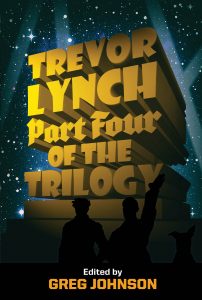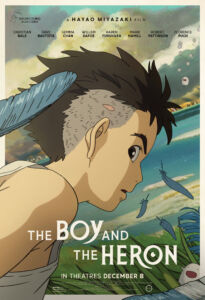At the age of 83, Japanese filmmaker Hayao Miyazaki is the greatest creator of animated films since Walt Disney. But Miyazaki is not resting on his laurels. Instead, just last year he released The Boy and the Heron, his 12th feature film. The Boy and the Heron was released in Japan in July of 2023 and worldwide in December, so it is still playing in theaters in some areas.
The Boy and the Heron has many elements of Miyazaki’s other films. It especially reminds me of my favorite, My Neighbor Totoro (1988).
In Totoro, two small girls with an intelligent, hard-working father and a mother in the hospital move to the Japanese countryside, where they meet a somewhat brutish peasant lad and a grotesque but kind-hearted old lady.
In Heron, a young boy (Mahito) with an intelligent, hard-working father and a mother who dies when her hospital is firebombed by the Americans moves to the countryside, where he encounters multiple brutish peasant lads and grotesque yet kind-hearted old ladies.
In both films, the country houses are next to mysterious overgrown places where the children encounter supernatural beings, which are droll in Totoro and mostly terrifying in Heron.
In Heron, as in Spirited Away (2001), someone is snatched into another world and the child protagonist follows on a rescue mission.
In keeping with Miyazaki’s fascination with aeronautics, as seen in movies such as Porco Rosso (1992) and The Wind Rises (2013), Mahito’s father runs an airplane factory, cranking out fighters for the war effort.
Heron’s basic setup is similar to The Lion, the Witch, and the Wardrobe: During the Second World War, children are sent from the capital to a mysterious family home in the countryside, to keep them safe from bombing. There, the children discover doors to another world.
Is The Boy and the Heron derivative, then? It would be more accurate to say that all of Miyazaki’s films derive from the author himself, so naturally you will see common elements in multiple films. The Boy and the Heron, in particular, has elements of autobiography. Like Mahito, Miyazaki had a father who worked in aeronautics, his mother died when he was young, and his family evacuated to the countryside to avoid American bombs. None of this would seem “derivative” if there were a strong and original story knitting all these elements together. Unfortunately, there isn’t.

You can buy Trevor Lynch’s Part Four of the Trilogy here.
I found The Boy and the Heron deeply perplexing. The movie starts out terrifying as a city is consumed by American firebombs. The second act in the countryside is enchanting and mysterious. But by the third act, the story doesn’t appear to be going anywhere and starts to become boring. The ending is happy for the characters, but I just felt relieved it was over.
I found the character of the heron particularly ambiguous, grotesque, and disturbing. The heron isn’t just a heron. It seems to be the host of a hideous parasite who looks a bit like A. Wyatt Mann’s Happy Merchant. The parasite’s purpose is unclear. He’s supposed to be messenger, guide, and even a protector, but he’s not just ugly, he’s cowardly, unreliable, and leaves bird droppings everywhere.
Critics have been very kind to The Boy and the Heron. I suspect, though, that they were watching it through the eyes of critics — i.e., as adults. And even then, they were wondering what was going on, thinking “Maybe I just don’t understand the culture,” and making mental notes to revisit certain scenes to see if they could make sense of them later. But those are bad signs.
They surely weren’t asking themselves how children would see this film. Yet Miyazaki is not producing cartoons for grownups, but for kids of all ages. If I found The Boy and the Heron confusing, then increasingly boring, I imagine small children felt the same way. There are many beautiful and imaginative images, interesting characters, strange turns of events, and deep themes, particularly in relation to loving fate and accepting mortality. But, sadly, The Boy and the Heron is less than the sum of its parts.
Enjoyed this article?
Be the first to leave a tip in the jar!
* * *
Counter-Currents has extended special privileges to those who donate at least $10/month or $120/year.
- Donors will have immediate access to all Counter-Currents posts. Everyone else will find that one post a day, five posts a week will be behind a “paywall” and will be available to the general public after 30 days. Naturally, we do not grant permission to other websites to repost paywall content before 30 days have passed.
- Paywall member comments will appear immediately instead of waiting in a moderation queue. (People who abuse this privilege will lose it.)
- Paywall members have the option of editing their comments.
- Paywall members get an Badge badge on their comments.
- Paywall members can “like” comments.
- Paywall members can “commission” a yearly article from Counter-Currents. Just send a question that you’d like to have discussed to [email protected]. (Obviously, the topics must be suitable to Counter-Currents and its broader project, as well as the interests and expertise of our writers.)
To get full access to all content behind the paywall, please visit our redesigned Paywall page.

4 comments
I adore Japanese animation, thanks for brining this to my attention. Howl’s Moving Castle is beautiful and I also like From up on Poppy Hill. My kids have a bearing on my choice of beauty over darkness and insidious options.
I agree with your review. The film worked hard to put me to sleep when it wasn’t getting on my nerves. The heron character is pointless and stupid. But I love My Neighbor Totoro (1988).
Has anyone considered that maybe Miyazaki is just kind of senile?
You should also check out the work of Satoshi Kon if you like Miyazaki. His animated movie “Millennium Actress” is beautiful and has a great message about the importance of hope. And his “Paranoia Agent” is really great too and has a very nice message about not avoiding difficult realities. Definitely see the subtitled versions, not the English dubs.
Meh. I saw Kon’s 1990s Perfect Blue just last year, and found it boring, despite its graphic themes. Maybe it’s just me. I generally hate animation, although I believe I liked Miyazaki’s The Wind Rises when I saw it in theater a decade ago. I was just barely considering seeing Heron as a possible “filler” between two other movies I want to see soon. I thank Lynch for warning me off it.
If you have Paywall access,
simply login first to see your comment auto-approved.
Note on comments privacy & moderation
Your email is never published nor shared.
Comments are moderated. If you don't see your comment, please be patient. If approved, it will appear here soon. Do not post your comment a second time.